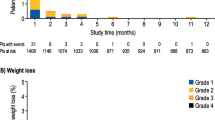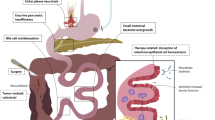Abstract
Purpose
Chemotherapy-induced diarrhea (CID) is a common symptom that occurs in 50 to 80% of patients. Given that the majority of the data on the occurrence and severity of CID is based on physician-rated toxicity criteria, this study’s purposes were to identify subgroups of patients with distinct CID profiles and determine how these subgroups differ in terms of demographic and clinical characteristics; severity, frequency, and distress of CID; the co-occurrence of common GI symptoms; and QOL.
Methods
Patients (n = 1133) completed the Memorial Symptom Assessment Scale six times over two cycles of chemotherapy. Latent profile analysis was used to identify subgroups of patients with distinct diarrhea profiles. Differences among these subgroups were evaluated using parametric and nonparametric statistics.
Results
Four distinct diarrhea profiles were identified: none (58.3%), decreasing (22.0%), increasing (5.2%), and high (14.5%). Compared with the none class, patients in the high class had a lower functional status, a worse comorbidity profile, were more likely to have gastrointestinal cancer, and were more likely to receive chemotherapy on a 14-day cycle. No differences were found among the classes in the percentages of patients who received chemotherapy with a targeted therapy.
Conclusion
Given that CID occurred in over 40% of the patients, clinicians should assess for this symptom and other common GI symptoms and initiate appropriate pharmacologic and dietary interventions.


Similar content being viewed by others
Data availability
Data will be provided to the publisher after they obtain a material transfer agreement from the University of California, San Francisco.
References
Andreyev J, Ross P, Donnellan C, Lennan E, Leonard P, Waters C, Wedlake L, Bridgewater J, Glynne-Jones R, Allum W, Chau I, Wilson R, Ferry D (2014) Guidance on the management of diarrhoea during cancer chemotherapy. Lancet Oncol 15:e447–e460
Babor TF, Higgins-Biddle JC, Saunders JB, Monteiro MG (2001) AUDIT: the alcohol use disorders identification test: guidelines for use in primary care. In: AUDIT: the alcohol use disorders identification test: guidelines for use in primary care. World Health Organization, Geneva, Switzerland
Bossi P, Antonuzzo A, Cherny NI, Rosengarten O, Pernot S, Trippa F, Schuler U, Snegovoy A, Jordan K, Ripamonti CI (2018) Diarrhoea in adult cancer patients: ESMO clinical practice guidelines. Ann Oncol 29(Suppl 4):iv126–iv142
Cascinu S, Barni S, Labianca R, Del Ferro E, Rocchi MB, Ligi M, Pessi MA, Cazzaniga M, Zamparelli G, Ardizzoia A, Ugolini G, Ghiandoni G, Luporini G, Catalano G (1997) Evaluation of factors influencing 5-fluorouracil-induced diarrhea in colorectal cancer patients. An Italian Group for the Study of Digestive Tract Cancer (GISCAD) study. Support Care Cancer 5:314–317
Doong SH, Dhruva A, Dunn LB, West C, Paul SM, Cooper BA, Elboim C, Abrams G, Merriman JD, Langford DJ, Leutwyler H, Baggott C, Kober K, Aouizerat BE, Miaskowski C (2015) Associations between cytokine genes and a symptom cluster of pain, fatigue, sleep disturbance, and depression in patients prior to breast cancer surgery. Biol Res Nurs 17:237–247
Eshragh J, Dhruva A, Paul SM, Cooper BA, Mastick J, Hamolsky D, Levine JD, Miaskowski C, Kober KM (2017) Associations between neurotransmitter genes and fatigue and energy levels in women after breast cancer surgery. J Pain Symptom Manag 53:67–84
Extermann M, Bonetti M, Sledge GW, O'Dwyer PJ, Bonomi P, Benson AB 3rd (2004) MAX2--a convenient index to estimate the average per patient risk for chemotherapy toxicity; validation in ECOG trials. Eur J Cancer 40:1193–1198
Extermann M, Boler I, Reich RR, Lyman GH, Brown RH, DeFelice J, Levine RM, Lubiner ET, Reyes P, Schreiber FJ 3rd, Balducci L (2012) Predicting the risk of chemotherapy toxicity in older patients: the Chemotherapy Risk Assessment Scale for High-Age Patients (CRASH) score. Cancer 118:3377–3386
Ferrell BR (1995) The impact of pain on quality of life. A decade of research. Nurs Clin North Am 30:609–624
Gibson RJ, Stringer AM (2009) Chemotherapy-induced diarrhoea. Curr Opin Support Palliat Care 3:31–35
Han CJ, Reding K, Cooper BA, Paul SM, Conley YP, Hammer M, Kober KM, Levine JD, Miaskowski C (2019) Stability of symptom clusters in patients with gastrointestinal cancers receiving chemotherapy. J Pain Symptom Manage 58:989–1001.e1010
Hwang KH, Cho OH, Yoo YS (2016) Symptom clusters of ovarian cancer patients undergoing chemotherapy, and their emotional status and quality of life. Eur J Oncol Nurs 21:215–222
Karnofsky D (1977) Performance scale. Plenum Press, New York
Keefe DM, Elting LS, Nguyen HT, Grunberg SM, Aprile G, Bonaventura A, Selva-Nayagam S, Barsevick A, Koczwara B, Sonis ST (2014) Risk and outcomes of chemotherapy-induced diarrhea (CID) among patients with colorectal cancer receiving multi-cycle chemotherapy. Cancer Chemother Pharmacol 74:675–680
Lindner AU, Resler AJ, Carberry S, Oficjalska K, Bacon O, Lee CS, Choudhry A, Burke JP, Sheahan K, Cremona M, Hennessy BT, McNamara D, Doherty G, Ryan EJ, Prehn JHM (2020) Systems biology analysis identifies molecular determinants of chemotherapy-induced diarrhoea. J Mol Med (Berl) 98:149–159
Loganayagam A, Arenas Hernandez M, Corrigan A, Fairbanks L, Lewis CM, Harper P, Maisey N, Ross P, Sanderson JD, Marinaki AM (2013) Pharmacogenetic variants in the DPYD, TYMS, CDA and MTHFR genes are clinically significant predictors of fluoropyrimidine toxicity. Br J Cancer 108:2505–2515
McQuade RM, Stojanovska V, Abalo R, Bornstein JC, Nurgali K (2016) Chemotherapy-induced constipation and diarrhea: pathophysiology, current and emerging treatments. Front Pharmacol 7:414
Miaskowski C, Cooper BA, Melisko M, Chen LM, Mastick J, West C, Paul SM, Dunn LB, Schmidt BL, Hammer M, Cartwright F, Wright F, Langford DJ, Lee K, Aouizerat BE (2014) Disease and treatment characteristics do not predict symptom occurrence profiles in oncology outpatients receiving chemotherapy. Cancer 120:2371–2378
Muthen LK, Muthen BO (1998-2020) Mplus user's guide (8th ed.). Muthen & Muthen, Los Angeles
Muthen B, Shedden K (1999) Finite mixture modeling with mixture outcomes using the EM algorithm. Biometrics 55:463–469
Nolden A, Joseph PV, Kober KM, Cooper BA, Paul SM, Hammer MJ, Dunn LB, Conley YP, Levine JD, Miaskowski C (2019) Co-occurring gastrointestinal symptoms are associated with taste changes in oncology patients receiving chemotherapy. J Pain Symptom Manag 58:756–765
Padilla GV, Ferrell B, Grant MM, Rhiner M (1990) Defining the content domain of quality of life for cancer patients with pain. Cancer Nurs 13:108–115
Portenoy RK, Thaler HT, Kornblith AB, Lepore JM, Friedlanderklar H, Kiyasu E, Sobel K, Coyle N, Kemeny N, Norton L, Scher H (1994) The Memorial Symptom Assessment Scale - an instrument for the evaluation of symptom prevalence, characteristics and distress. Eur J Cancer 30a:1326–1336
Richardson G, Dobish R (2007) Chemotherapy induced diarrhea. J Oncol Pharm Pract 13:181–198
Roila F, Molassiotis A, Herrstedt J, Aapro M, Gralla RJ, Bruera E, Clark-Snow RA, Dupuis LL, Einhorn LH, Feyer P, Hesketh PJ, Jordan K, Olver I, Rapoport BL, Roscoe J, Ruhlmann CH, Walsh D, Warr D, van der Wetering M, Participants of the MECCC (2016) 2016 MASCC and ESMO guideline update for the prevention of chemotherapy- and radiotherapy-induced nausea and vomiting and of nausea and vomiting in advanced cancer patients. Ann Oncol 27:v119–v133
Rosenoff SH, Gabrail NY, Conklin R, Hohneker JA, Berg WJ, Warsi G, Maloney J, Benedetto JJ, Miles EA, Zhu W, Anthony L (2006) A multicenter, randomized trial of long-acting octreotide for the optimum prevention of chemotherapy-induced diarrhea: results of the STOP trial. J Support Oncol 4:289–294
Rugo HS, Di Palma JA, Tripathy D, Bryce R, Moran S, Olek E, Bosserman L (2019) The characterization, management, and future considerations for ErbB-family TKI-associated diarrhea breast. Cancer Res Treat 175:5–15
Russell J, Wong ML, Mackin L, Paul SM, Cooper BA, Hammer M, Conley YP, Wright F, Levine JD, Miaskowski C (2019) Stability of symptom clusters in patients with lung cancer receiving chemotherapy. J Pain Symptom Manag 57:909–922
Sangha O, Stucki G, Liang MH, Fossel AH, Katz JN (2003) The Self-Administered Comorbidity Questionnaire: a new method to assess comorbidity for clinical and health services research. Arthritis Rheum 49:156–163
Singh K, Kober KM, Paul SM, Hammer M, Wright F, Conley YP, Levine JD, Miaskowski C (2020) Gastrointestinal symptoms are associated with trajectories of chemotherapy-induced nausea. Support Care Cancer 28:2205–2215
Sloan JA, Goldberg RM, Sargent DJ, Vargas-Chanes D, Nair S, Cha SS, Novotny PJ, Poon MA, O'Connell MJ, Loprinzi CL (2002) Women experience greater toxicity with fluorouracil-based chemotherapy for colorectal cancer. J Clin Oncol 20:1491–1498
SPSS (2015) IBM SPSS for windows (version 23). SPSS, Inc., Armonk
Stein BN, Petrelli NJ, Douglass HO, Driscoll DL, Arcangeli G, Meropol NJ (1995) Age and sex are independent predictors of 5-fluorouracil toxicity. Analysis of a large scale phase III trial. Cancer 75:11–17
Stein A, Voigt W, Jordan K (2010) Chemotherapy-induced diarrhea: pathophysiology, frequency and guideline-based management. Ther Adv Med Oncol 2:51–63
Sullivan CW, Leutwyler H, Dunn LB, Cooper BA, Paul SM, Levine JD, Hammer M, Conley YP, Miaskowski CA (2018) Stability of symptom clusters in patients with breast cancer receiving chemotherapy. J Pain Symptom Manag 55:39–55
Tarricone R, Abu Koush D, Nyanzi-Wakholi B, Medina-Lara A (2016) A systematic literature review of the economic implications of chemotherapy-induced diarrhea and its impact on quality of life. Crit Rev Oncol Hematol 99:37–48
Viele CS (2003) Overview of chemotherapy-induced diarrhea. Semin Oncol Nurs 19:2–5
Ware J Jr, Kosinski M, Keller SD (1996) A 12-item short-form health survey: construction of scales and preliminary tests of reliability and validity. Med Care 34:220–233
Wright F, D'Eramo Melkus G, Hammer M, Schmidt BL, Knobf MT, Paul SM, Cartwright F, Mastick J, Cooper BA, Chen LM, Melisko M, Levine JD, Kober K, Aouizerat BE, Miaskowski C (2015) Predictors and trajectories of morning fatigue are distinct from evening fatigue. J Pain Symptom Manag 50:176–189
Zachariah B, Gwede CK, James J, Ajani J, Chin LJ, Donath D, Rosenthal SA, Kane BL, Rotman M, Berk L, Kachnic LA (2010) Octreotide acetate in prevention of chemoradiation-induced diarrhea in anorectal cancer: randomized RTOG trial 0315. J Natl Cancer Inst 102:547–556
Funding
This study was funded by a grant from the National Cancer Institute (CA134900). Dr. Miaskowski is an American Cancer Society Clinical Research Professor.
Author information
Authors and Affiliations
Contributions
All of the authors participated in the revisions to this paper and the interpretation of the results and approved the final paper.
Corresponding author
Ethics declarations
Conflict of interest
The authors declare that they have no conflicts of interest.
Ethics approval
This study was approved by the Committee on Human Research at the University of California and the Institutional Review Boards at each of the study sites.
Consent to participate
Written informed consent was obtained from all of the patients.
Consent for publication
All of the authors read the final version of the paper and approved its submission for publication.
Additional information
Publisher’s note
Springer Nature remains neutral with regard to jurisdictional claims in published maps and institutional affiliations.
Rights and permissions
About this article
Cite this article
Diaz, R., Kober, K.M., Viele, C. et al. Distinct diarrhea profiles during outpatient chemotherapy. Support Care Cancer 29, 2363–2373 (2021). https://doi.org/10.1007/s00520-020-05753-x
Received:
Accepted:
Published:
Issue Date:
DOI: https://doi.org/10.1007/s00520-020-05753-x




